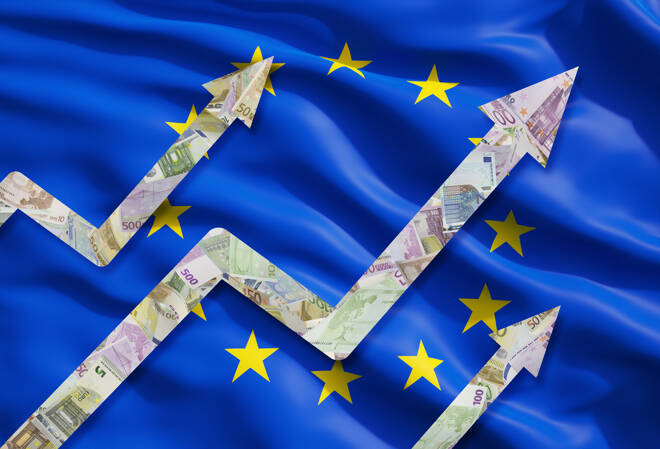Advertisement
Advertisement
European Equities: A Week in Review – 18/12/20
By:
It was a bullish week for the European majors. Private sector PMI figures, Brexit, COVID-19 vaccine updates, and U.S stimulus talks delivered support.
The Majors
It was a bullish week for the European majors in the week ending 18th December. The DAX30 rallied by 3.94%, with the CAC40 and the EuroStoxx 600 seeing more modest gains of 0.37% and 1.48% respectively.
Progress on Capitol Hill towards a COVID-19 stimulus package and renewed hopes of a Brexit deal drove demand for the majors.
COVID-19 vaccine news also delivered support. News of the EMA bringing forward its review of the BioNTech/Pfizer Inc. vaccine to next week was market positive.
Both France and Germany announced that vaccinations would likely commence before the end of the year.
On the economic data front, impressive manufacturing PMI figures from Germany supported the DAX30 rally.
Economic data from the U.S disappointed. The numbers failed to spook the markets, however. Gloomy labor market numbers fuelled optimism towards a $900bn stimulus package.
The Stats
It was a busy week on the economic calendar.
Key stats included December prelim private sector PMI figures for France, Germany, and the Eurozone.
Germany’s manufacturing PMI hit a 34-month high, rising from 57.8 to 58.6. The services sector continued to contract, however, albeit at a slower pace, with the PMI rising from 46.0 to 47.7.
France’s manufacturing sector also got a boost, with the PMI rising from 49.6 to 51.1. While the manufacturing sector returned to expansion, the services sector also continued to contract. The services PMI jumped from 38.8 to 49.2.
As a result of the pickup in manufacturing sector activity, the Eurozone’s manufacturing PMI rose from 53.8 to 55.5. The services PMI increased from 41.7 to 47.3, leading to a rise in the Composite from 45.3 to 49.8.
At the end of the week, business sentiment figures were also positive. The IFO Business Climate Index rose from 90.9 to 92.1 in December. Improved sentiment towards the next 6-months and economic resilience amidst the latest lockdown measures supported the uptick. The Current Assessment sub-Index rose from 90.0.to 91.3, with the Business Expectations sub-index rising from 91.8 to 92.8.
Other stats in the week included finalized November inflation figures and Eurozone trade, industrial production, and wage growth figures.
These stats had a muted impact on the majors, however.
From the U.S
Economic data disappointed in the week. Retail sales continued to decline in November, with service sector activity expanding at a slower pace in December.
Jobless claims also raised more red flags, with initial jobless claims rising from 862k to 885k in the week ending 11th December.
On the monetary policy front, the FED delivered its last monetary policy decision of the year. The FED held monetary policy unchanged while revising growth forecasts upwards.
In spite of the GDP revisions, the FED assured a continuation of the bond purchasing program until progress is made towards maximum employment and inflation objectives.
From elsewhere
Economic data from China was skewed to the positive, with industrial production, retail sales, and unemployment seeing improved numbers in November.
The Market Movers
From the DAX, it was a bullish week for the auto sector. Volkswagen and Continental rallied by 9.21% and by 8.08% respectively, with BMW and Daimler seeing gains of 5.30% and 7.12% respectively.
It was also a bullish week for the banking sector. Commerzbank and Deutsche Bank ended the week up by 4.13% and by 2.73% respectively.
From the CAC, it was a mixed week for the banks. BNP Paribas and Soc Gen rose by 1.02% and by 2.16% respectively. Credit Agricole ended the week flat.
It was a bullish week for the French auto sector, however. Peugeot rallied by 7.09, with Renault gaining 3.08%.
Air France-KLM followed last week’s 5.94% slide with a 5.02% loss, with Airbus ending the week down by 3.46%.
On the VIX Index
It was back into the red for the VIX. In the week ending 18th December, the VIX fell by 7.46%. Partially reversing a 12.12% gain from the previous week, the VIX ended the week at 21.57.
For the week, NASDAQ rallied by 3.05%, with the Dow and S&P500 rising by 0.44% and by 1.25% respectively.
While progress towards a stimulus package on Capitol Hill had supported the majors in the week, failure to deliver limited the upside. Stocks ended the day in the red on Friday as lawmakers failed to cross the line.
COVID-19 vaccine news and a dovish FED were also positives for the markets. Expectations of more support allowed the markets to brush aside disappointing data and spike in new COVID-19 cases.
The Week Ahead
It’s a particularly quiet and shortened week ahead on the economic calendar.
Key stats in the week include Eurozone flash consumer confidence figures and Germany’s GfK consumer climate figures.
With the anticipation of a COVID-19 vaccine rollout, the sentiment is likely to improve that should support the majors.
From the U.S, it’s a busier week ahead. With the European boerses closed or scheduled for an early close, however, key stats are limited to inflation and personal spending figures.
Finalized 3rd quarter GDP numbers, housing sector figures, finalize consumer sentiment data should have a muted impact.
Away from the economic calendar, expect COVID-19 news updates, Brexit, and U.S politics to remain key areas of focus, however.
About the Author
Bob Masonauthor
With over 28 years of experience in the financial industry, Bob has worked with various global rating agencies and multinational banks. Currently he is covering currencies, commodities, alternative asset classes and global equities, focusing mostly on European and Asian markets.
Advertisement
